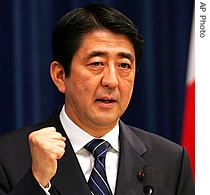2007年VOA标准英语-Japan Prime Minister's Job in Peril in Coming E
时间:2019-01-12 作者:英语课 分类:2007年VOA标准英语(七月)
Tokyo
26 July 2007
Japan's Prime Minister Shinzo Abe is battling to hold onto power in elections on Sunday for the upper house of parliament. His popularity is at new lows because of political scandals and a perception he is not focusing on the nation's problems. Catherine Makino reports from Tokyo.

Japanese Prime Minister Shinzo Abe raises a fist as he addresses a press conference (File)
Sunday's election will be the first national verdict on Prime Minister Shinzo Abe's performance since he came to office last September by becoming the head of the dominant 1 Liberal Democratic Party.
Public opinion polls indicate the ruling coalition 2 could lose control of the upper house of parliament in the vote.
Mr. Abe has been hit by gaffes 3 and scandals involving his ministers, which led three of them to resign, and one to commit suicide. One poll shows that only 28 percent of the public approves of his performance.
Some critics say the biggest campaign topic is the government's blunder in losing 50 million pension records - leaving people worried about their retirement 4 funds.
Andrew Horvat, a visiting professor of economics at Tokyo Keizai University, says the prime minister's agenda is different from the people's agenda, and that is why the LDP will suffer heavy losses.
Mr. Abe has ignored economic issues and focused on constitutional revision and a more patriotic 5 educational system.
"For the man on the street, Japan has been in a recession for 15 years, … but this is also an example of some problems that the present government is not addressing, which is the polarization of incomes," said Horvat. "Ordinary people have not seen an improvement in their lives in about 15 years."
In one poll, 42 percent of voters said they were worse off than they were last year and only seven percent said their situations had improved. Mr. Abe's focus on rewriting the country's 1947 pacifist constitution was at the bottom of voters' lists of priorities for the government.
If the result Sunday is a severe loss, LDP members may choose a new leader, who would become prime minister.
"Abe might have to resign if he loses," he said. "Even if it goes down two or three seats his entire agenda will be discredited 6."
A loss, however, will not necessarily force Mr. Abe out of office. The LDP and its coalition partners still control the more powerful lower house of parliament, which approves the prime minister. But it would make it harder to pass legislation, because the opposition 7 in the upper house could delay or kill bills.
Mr. Abe's coalition needs to win at least 64 of the 121 seats up for grabs Sunday. The coalition currently maintains control with 132 seats. The upper house of parliament has a total of 242 seats, and half of them are up for election.
- The British were formerly dominant in India.英国人从前统治印度。
- She was a dominant figure in the French film industry.她在法国电影界是个举足轻重的人物。
- The several parties formed a coalition.这几个政党组成了政治联盟。
- Coalition forces take great care to avoid civilian casualties.联盟军队竭尽全力避免造成平民伤亡。
- The presidential candidate made three mistakes, or gaffes, during his speech. 校长候选人在演讲中出了三次错,或失态。 来自超越目标英语 第4册
- When the microphones were on, gaffes gushed from his lips. 而当电话响起,他却口无遮拦,屡屡失言。 来自互联网
- She wanted to enjoy her retirement without being beset by financial worries.她想享受退休生活而不必为金钱担忧。
- I have to put everything away for my retirement.我必须把一切都积蓄起来以便退休后用。
- His speech was full of patriotic sentiments.他的演说充满了爱国之情。
- The old man is a patriotic overseas Chinese.这位老人是一位爱国华侨。
- The reactionary authorities are between two fires and have been discredited. 反动当局弄得进退维谷,不得人心。
- Her honour was discredited in the newspapers. 她的名声被报纸败坏了。
- The party leader is facing opposition in his own backyard.该党领袖在自己的党內遇到了反对。
- The police tried to break down the prisoner's opposition.警察设法制住了那个囚犯的反抗。